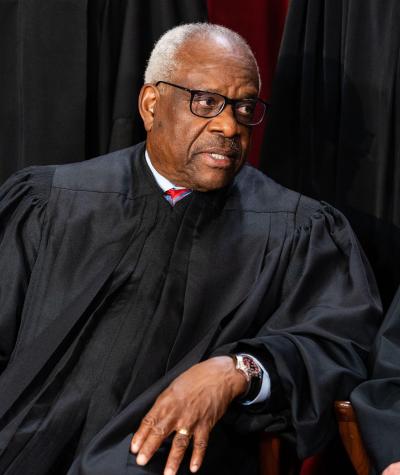Campaign Legal Center has sent a letter to the Judicial Conference requesting that it exercise its power under federal law to refer Supreme Court Justice Clarence Thomas to the U.S. Attorney General for willfully failing to disclose gifts of free travel that he has received for over twenty years. If it is found that he intentionally violated the Ethics in Government Act (EIGA), Justice Thomas could face potential civil and criminal penalties.
Transparency and accountability are integral for ensuring that government officials, including Supreme Court justices, are acting on behalf of the people they are appointed or elected to serve. If these disclosure laws are not enforced, the public does not know if Supreme Court justices are favoring their own personal interests over those of the American populace. As justices have lifetime tenure on the nation’s highest court, these concerns are heightened in the case of Justice Thomas.
The EIGA requires Supreme Court justices to file annual financial disclosure statements that include “the identity of the source, a brief description, and the value of all gifts” worth more than $415 from a single source. Justices must also include all reimbursements they have received to cover travel-related expenses.
Despite this, the independent, non-profit newsroom ProPublica recently uncovered that Justice Thomas has been accepting travel gifts for over twenty years from one source without reporting them on his financial disclosure reports. These trips include a trip to Indonesia estimated to cost over $500,000 that included use of the individual’s private jet and a yacht as well as an extended cruise in New Zealand aboard the same person’s yacht. ProPublica also identified at least five other times Justice Thomas used this person’s private jet.
Justice Thomas released a statement following the reporting, claiming that he was not required to disclose these gifts. However, that is not the case. These are longstanding disclosure requirements for reporting gifts of free travel under EIGA. As a result, there is evidence that the omission was willful, which triggers the jurisdiction of the Department of Justice.
First, Justice Thomas was aware of the requirement based on his 1997 disclosure of free travel on the personal plane of the same individual who provided the free travel he did not disclose in subsequent years.
Interestingly, Justice Thomas stopped disclosing gifts from the individual after the Los Angeles Times reported that he accepted the private travel in 2004, despite continuing to receive travel gifts.
In addition, Justice Thomas previously admitted that he omitted significant information from his financial disclosure reports in 2011, stating that the information was “inadvertently omitted due to a misunderstanding of the filing instructions.” However, when he was a federal commissioner and judge prior to joining the Supreme Court, he accurately filed the same financial disclosure forms.
When such overwhelming evidence of blatant ethics violation is made public, it is critical for the public’s trust in our democratic institutions that Supreme Court justices are held accountable. That is why it is imperative that the Judicial Conference refer this matter to the U.S. Attorney General.

